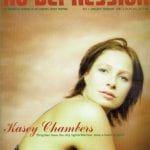Kasey Chambers – Sweet Emotion
“This is a song,” Kasey Chambers tells the audience at Wolf Trap, “that I wrote about all the radio stations around the world who play Britney Spears and not me.”
She chuckles at her own joke. The very idea of this Australian singer-songwriter competing for airplay and audience with the Pepsi commercial icon is amusing — it’s like Steve Earle complaining about Puff Daddy, or Ichiro Suzuki complaining about Tiger Woods. They’re playing different ballgames.
Besides, on this night Chambers has achieved something Spears will never enjoy. It is June 1, 2001, just three days before Chambers’ 25th birthday, and she is opening up for two of her biggest heroes, Lucinda Williams and Richard Thompson, at the National Park Service’s open-sided, cathedral-like pavilion in the Virginia suburbs of Washington, D.C.
Chambers’ levity soon fades as she launches into the song, which is a centerpiece of her second solo album, Barricades And Brickwalls, to be released January 29 on Warner Bros. Maybe she is addressing radio programmers, maybe she is addressing a would-be lover, but there is a very real ache in her voice when she sings the opening lines:
Am I not pretty enough?
Is my heart too broken?
Do I cry too much?
Am I too outspoken?
Don’t I make you laugh?
Should I try it harder?
Why do you see right through me?
This song, “Not Pretty Enough”, will prove the highlight of a long, wonderful evening. As good as Thompson and Williams will be later on, they have little left to prove, sailing through their sets with the assurance and mastery they have earned. For Chambers, though, this is all still very new — playing for thousands of people, sharing the stage with her heroes — and she pushes herself into risks that pay off with breathtaking results.
She’s not nearly the songwriter that Thompson and Williams have become, but very few are, and at 24 she’s a good songwriter with the potential to get much better. Furthermore, she’s already a better singer than Thompson or Williams ever have been or ever will be. Not only does she have a lovely, silky soprano, but she also has that catch-in-the-throat quality Judy Garland, Dinah Washington, Bonnie Raitt and Julie Miller have had. Her voice can be so emotionally transparent that nothing is held back, and so strong that it can survive the consequences.
And Chambers has that rarest of vocal gifts: the ability to convey two contradictory emotions at once. When she sings the line “Am I not pretty enough?” at Wolf Trap, there is a suggestion of doubt, as if she weren’t sure if she were attractive enough to hold a man’s loyalty. But there’s also a suggestion that she knows she’s pretty and can’t understand why the man can’t recognize it.++++++++++++++++++++++++++++++++++++++++
This is an excerpt of the full article which appeared in The Best of No Depression: Writing About American Music, which features 25 of the finest articles from the magazines back issues, and was published in 2005 by University of Texas Press to help celebrate the magazines 10th anniversary. Due to our agreement with UT Press we are unable to include this article in our online archive.
The Best of No Depression is the only place you can find these articles other than our back issues. Visit the No Depression store to buy your copy for only $10.
The 300-page volume includes co-editor Grant Aldens award-winning 2001 feature on Billy Joe Shaver, co-editor Peter Blackstocks 1998 Artist of the Decade piece on Alejandro Escovedo, senior editor Bill Friskics-Warrens 2002 cover story on Johnny Cash, contributing editor Paul Cantins deep exploration of Yankee Hotel Foxtrot-era Wilco; and many other high points from our print heyday.
Table of contents for The Best of No Depression:
Preface, by Grant Alden and Peter Blackstock
Los Lobos, by Geoffrey Himes
Alejandro Escovedo, by Peter Blackstock
Jon Dee Graham, by Peter Blackstock
Billy Joe Shaver, by Grant Alden
Ray Wylie Hubbard, by John T. Davis
Flatlanders, by Don McLeese
Ray Price, by David Cantwell
Johnny Gimble, by Bill C. Malone
Johnny Cash, by Bill Friskics-Warren
Rosanne Cash, by Lloyd Sachs
Lucinda Williams, by Silas House
Buddy & Julie Miller, by Bill Friskics-Warren
Kasey Chambers, by Geoffrey Himes
Loretta Lynn, by Barry Mazor
Patty Loveless, by Bill Friskics-Warren
Kieran Kane, by Peter Cooper
Paul Burch, by Jim Ridley
Hazel Dickens, by Bill Friskics-Warren
Gillian Welch, by Grant Alden
Ryan Adams, by David Menconi
Jay Farrar, by Peter Blackstock
Jayhawks, by Erik Flannigan
Wilco, by Paul Cantin
Drive-By Truckers, by Grant Alden
Iron & Wine, by William Bowers




